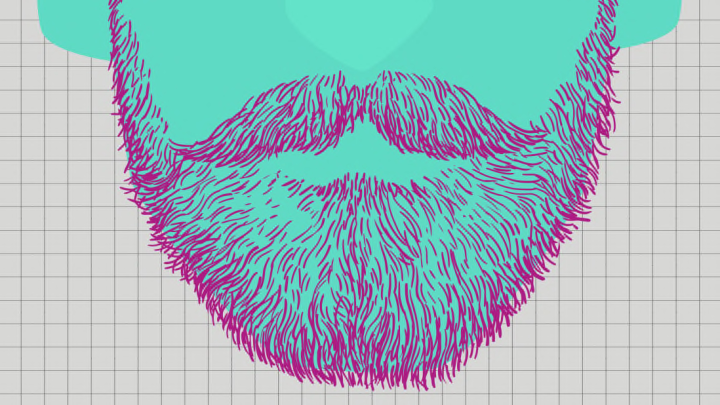History has perhaps known no greater proponent of the beard than T. S. Gowing. He admired chin whiskers so much that he penned a book on the subject in 1854, entitled The Philosophy of Beards.
It's based on an earlier lecture that the author gave about beards from a physiological, artistic, and historical perspective, which was apparently so well-received that Gowing—“an almost unknown pro-beard activist in Britain,” according to the book’s description on Amazon—decided to turn it into a 72-page publication.
Gowing believed it to be the first lecture on beards, which he described as a natural gift from God intended “for distinction, protection, and ornament.” Here are a few other reasons why Gowing loved beards—and why you should, too.
1. BEARDS ARE THE EPITOME OF MANLINESS.
It was a different time back then, and people had some fairly rigid ideas about what masculinity and femininity meant. The beard, naturally, fell into the former camp. Gowing called beards “the true standard of masculine beauty of expression” and argued that shaving them off makes men more effeminate. So why don’t women have beards, you might ask? Because women were “never intended to be exposed to the hardships and difficulties men are called upon to undergo,” Gowing argues. However, Gowing mentions a couple notable exceptions, including a female soldier in the army of Charles XII who “fought with a courage worthy of her Beard.”
2. MEN FROM SOME OF THE WORLD’S MOST CELEBRATED CIVILIZATIONS SPORTED FACIAL HAIR.
“All the leading races of men, whether of warm or cold climates … were furnished with an abundant growth of this natural covering,” Gowing writes, citing the Egyptians, Assyrians, Babylonians, Greeks, Romans, and more as examples. Egyptian kings were depicted as having beards, as were Etruscan gods. Gowing didn’t think this was merely a coincidence either, arguing that the absence of a beard is a sign of physical and moral weakness.
3. BEARDS PROTECT YOU FROM COLD, MOISTURE, AND DISEASE.
Men without beards suffer more frequently from colds, sore throats, and rheumatic pains, medical texts from the period purported. Gowing also claimed that blacksmiths and stonemasons were protected from disease because their beards collect “iron and stone dust” and prevent these substances from being inhaled into the lungs. (There might be something to that claim: One study revealed that beards sometimes harbor bacteria-killing microbes.) As for the claim that beards keep the wearer warm, Gowing had to look no further than his own face for evidence: The author, recalling a frigid six-week excursion in Switzerland during which he grew out his mustache, reportedly “never felt the least uncomfortableness about the mouth.”
4. MEN’S CHINS ARE UGLY.
The author isn’t the only one who thinks so, either. He quoted a lecture given at the Government School of Practical Art, in which the speaker argued that men’s chins are designed to be covered because they’re unsightly, harsh, and angular, whereas women’s chins are “generally beautiful.” (The lecturer supported his argument by noting that "The bear, the rabbit, the cat, and the bird, are hideous to look upon when deprived of their hairy and feathery decorations: but the horse, the greyhound, and other animals so sparingly covered that the shape remains unaltered by the fur, are beautiful even in their naked forms.") This is especially true as men age and acquire more wrinkles, Gowing notes, adding that “there is scarcely indeed a more naturally disgusting object than a beardless old man (compared by the Turks to a ‘plucked pigeon’).”
5. BEARDS REGULATE ELECTRICITY?
While the author acknowledged that there has been little scientific research on the subject, he stressed that beards “serve as a non-conductor of heat and electricity” and help regulate “the electricity which is so intimately connected with the condition of the nerves.” Unfortunately, he didn’t elucidate this point, but he may have been confusing beard hairs with vibrissae, or animal whiskers. Unlike human facial hair, whiskers act as sensory organs that can give key information about the location, size, and texture of an object upon brushing against it based on movements of the vibrissae.
6. GROOMING IS FUN.
Speaking of our furry friends, combing and brushing the beard “confers a positively delightful sensation, similar to that which one may imagine a cat to experience,” Gowing notes. There may have been some purring involved in his description
7. SHAVING IS TERRIBLE.
Shaving your beard will irritate your face and cause the formation of “pimply eruptions," as well as a skin condition so irritating that Gowing likened it to “a foretaste of purgatory.” Indeed, our thick-bearded brothers suffer the most, “for the more efficient the natural protection is, the greater is also the folly of its removal.”
8. THE LADIES LOVE IT.
The author sets out to dispel the myth that women don’t like beards, arguing that women like everything considered “manly.” Even if they think it looks strange at first, they’ll eventually come around, Gowing said. He provided anecdotal evidence of the 18th century Swiss painter Liotard, whose wife was reportedly so dismayed when he shaved off his beard that she remarked, “And such a little perking chin, to kiss it seemed almost a sin!”
